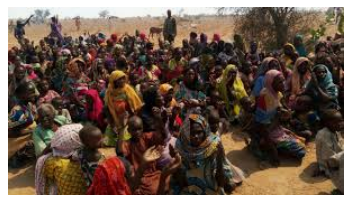By Olayinka Elebute
United Nations Office for the Coordination of Humanitarian Affairs (UNOCHA) on Tuesday said US$1 billion is needed in 2021 to address the humanitarian needs of those affected by ongoing insurgency in the North East.
It said that this much is needed to attend to the humanitarian needs of 6.4 million out of 8.7 million people affected by the crisis that has nearly brought the region on it’s knee for about 12 years.
A statement by UNOCHA lamented that the ongoing conflict continues to be the main driver of humanitarian needs in north- east Nigeria, where millions of people have been displaced.”
It also decried that long standing insecurity and violence, compounded by climate change, and the impact of COVID-19 are increasing the vulnerability of close to 9 million people, with about 2 million people internally displaced, while millions of people depend on humanitarian partners for basic services, even as 5.1 million people are facing hunger in the lean season, which was described as the worst outlook in four years.
The statement said: “The humanitarian community and the Government of Nigeria officially launched the north-east Nigeria Humanitarian Response Plan for 2021 earlier today (Tuesday). The plan requests US$1 billion to enable partners to provide critical services to the 6.4 million most vulnerable people – amongst a total of 8.7 million people in need of some form of humanitarian assistance in 2021.”
The statement quoted the United Nations Resident and Humanitarian Coordinator in Nigeria, Me. Edward Kallon to have said that: “The humanitarian crisis in Borno, Adamawa, and Yobe states, unfortunately, remains one of the largest in the world and continues to have a profound impact on Nigeria and its people, causing untold suffering and deprivation for millions of vulnerable women, men and children.
“The year 2021 marks the twelfth year of the conflict and the sixth year of the international community working together with the Government of Nigeria to provide humanitarian support.”
He lamented that: “Last year was a challenging year for vulnerable people in north-east Nigeria. It was a year marked by a new reality, the COVID-19 pandemic. The socio-economic impact of the pandemic has already diminished the resilience of millions of people, increasing the fragility of those who were already extremely vulnerable.”
The Minister of Humanitarian Affairs, Disaster Management and Social Development, Hajiya Sadiya Umar-Farouq, said: “The requirements for this 2021 Humanitarian Response Plan reflect a growing need, while we know that the available resources will very likely not be commensurate with those needs.”
She added that: “We are facing additional challenges in terms of security and access for humanitarian partners, which is why we have developed the National Humanitarian Development Peace Framework.”
Umar-Farouk said: “In 2020 the Government took major steps to strengthen its coordination and leadership role and structures at federal and state levels to bring better coherence to addressing humanitarian needs, while laying the foundation for stabilization and development of conflict-affected state.
“One of these steps includes the inauguration of the National Humanitarian Coordination Committee, which is the highest national advisory body to guide humanitarian activities in the country.”
UNOCHA lamented that a combination of escalating conflict, displacement, and disruption to and loss of livelihoods due to COVID- 19 restrictions, could lead to hunger for millions of Nigerians living in the north-east, stating that as many as 5.1 million people are threatened by acute hunger during the upcoming lean season – the worst outlook in four years.
It however said the humanitarian community remains committed to working closely with the Government of Nigeria and local communities to reduce protection risks, provide basic services, including shelter, health, water and sanitation, education, as well as food and nutrition and, moreover, livelihood opportunities, promising that the operation will increasingly seek to identify longer-term or durable solutions for those displaced, restoring dignity, self-reliance and hope for a better future, where possible.
Kallon said: “The main thrust of the operation in 2021 will continue to be providing lifesaving and life-sustaining support to people who are displaced, host communities, and others that are affected by the humanitarian crisis.”
He said: “This includes improving the living conditions in camps through decongestion and enhancing the quality of services. We will continue to prioritize prevention, development where feasible and humanitarian assistance where needed. A durable framework to find solution to the crisis in north east Nigeria must promote and implement the humanitarian, development and peace nexus.”
In 2020, only 55 per cent of the required funding for the Humanitarian Response Plan was secured notwithstanding the additional needs created by the COVID-19 pandemic, recording the lowest funding level since the beginning of the joint response. Nevertheless, humanitarian partners reached over five million people with potentially lifesaving services despite funding shortfalls, security challenges and movement restrictions caused by the ongoing violence and the COVID-19 pandemic. Malnutrition was averted for over two million children through their provision with fortified nutritious foods to address or prevent malnutrition, and two million people were reached with protection services, including sexual and gender-based violence prevention and response, enhanced mine awareness, and support in addressing housing land and property concerns.
 GongNews … truth in defense of a just society
GongNews … truth in defense of a just society




